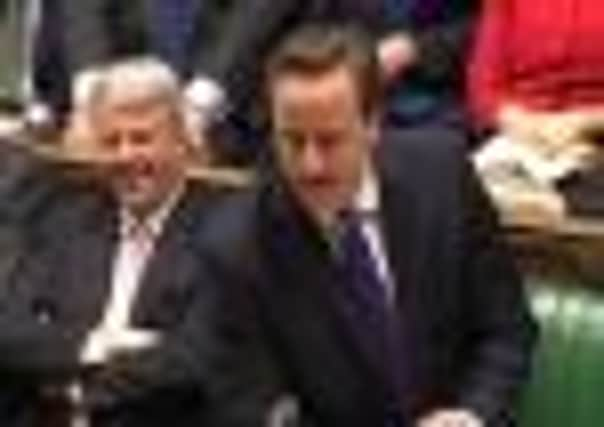Cameron pledge to claw back powers from EU bureaucrats


The Prime Minister delivered his long-awaited speech on Britain’s place in Europe yesterday and sparked unconcealed glee in the Conservative Party as he pledged that, if returned as Prime Minister in 2015, he will seek to overhaul fundamental aspects of the Treaty of Rome before offering the British public the opportunity to leave the EU for good.
A straight in/out referendum would be held in 2017, Mr Cameron said, before making clear he would campaign for Britain to stay in the EU “with all my heart and soul” if he first succeeds in clawing back powers from Brussels and reshaping the union as a more flexible organisation, focused on the single market.
Advertisement
Hide AdAdvertisement
Hide AdBut he left unanswered the critical question of whether he will campaign for Britain to leave the EU, should his negotiations in Brussels fail.
Labour was left scrambling for a clear position after Ed Miliband appeared to harden his stance, telling Mr Cameron that he “does not support an in/out referendum”. Aides later clarified that Labour does not support a referendum “in the current circumstances”.
Deputy Prime Minister Nick Clegg repeated his warning that the Prime Minister was creating “years of grinding uncertainty” for British firms with his plan for a 2017 referendum.
But the reaction among Yorkshire business leaders to the speech was largely positive, with industry captains welcoming Mr Cameron’s desire to win back powers from a new-look Brussels while staying in the EU.
Advertisement
Hide AdAdvertisement
Hide AdThe response from Europe was more hostile, however, with French Foreign Minister Laurent Fabius warning Britain it cannot just cherry-pick favourable aspects of EU law. “You can’t do Europe à la carte,” he said.
German Chancellor Angela Merkel struck a more conciliatory tone, saying she was “prepared to talk about British wishes” and “find a fair compromise”.
Her diplomatic response reflected the private conversations Mr Cameron has held with European leaders in advance of yesterday’s landmark speech, which had been postponed last week by the Algerian hostage crisis.
The Prime Minister assured his audience at the headquarters of financial giant Bloomberg that he is “not a British isolationist” and has “a positive vision” for the future of the EU.
Advertisement
Hide AdAdvertisement
Hide Ad“I never want us to pull up the drawbridge and retreat from the world,” he said.
But he insisted dramatic reform of the EU was essential if it is to retain the support of the public.
“Public disillusionment with the EU is at an all-time high,” he said. “The danger is that Europe will fail, and the British people will slide towards the exit.”
Mr Cameron refused to set out a “shopping list” of powers he wants to repatriate for Britain, but said “nothing should be off the table”. He made clear he wanted a “leaner, less bureaucratic union” which enjoyed the benefits of the single market but did not “try to snuff out” the wishes of countries that want more flexibility.
Advertisement
Hide AdAdvertisement
Hide AdMost dramatically, he called for countries to be able to pull out of the Treaty of Rome’s central commitment toward “an ever-closer union among the peoples of Europe”.
His twin promises of a new-look Europe and an in/out referendum by the end of 2017 were lauded by Tory backbenchers, who cheered him to the rafters as he entered the Commons for Prime Minister’s Questions.
But Mr Miliband said the Prime Minister had been forced into agreeing to the public vote by pressure from his own MPs.
“He is going to put Britain through years of uncertainty and take a huge gamble with our economy,” Mr Miliband told MPs.
“He has been driven to it not by the national interest – he has been dragged to it by his party.”